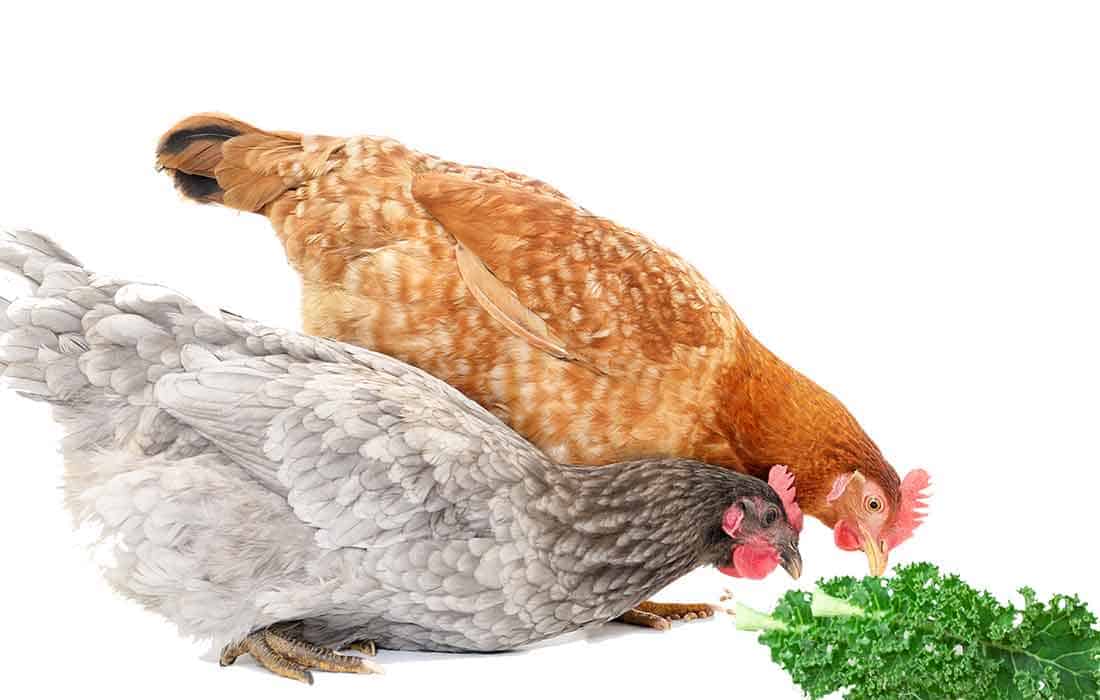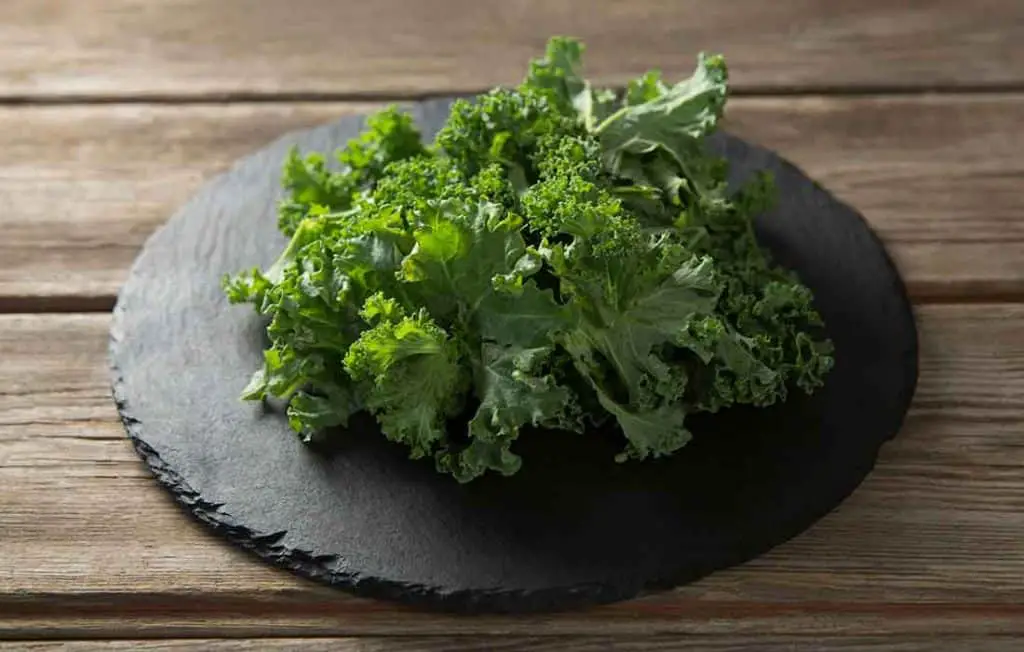Kale is a superfood for humans, but can chickens eat kale? Is it safe, toxic, or does it make a good snack for them?
Can Chickens Eat Kale?
Kale is a dark leafy green vegetable that contains high amounts of Vitamins A, K, B6, and C, potassium, and other nutrients that can benefit both humans and chickens. It can be served either cooked or fed raw just throw some leaves in the coop, and your birds will peck the leaves off the ground.
With the wide variety of treats that you can feed your chickens, it may be hard to recognize healthy foods and safe snacks.

Some foods may seem alright to share with your chickens, but many may actually be an unhealthy option for a treat, and some may even be toxic, making them deathly ill or weak.
Many vegetables and fruits provide unique health benefits for your chickens, just the same as they can provide us with proper nutrients. Kale has many benefits for chickens, but they don’t necessarily need to eat it.
As long as you’re feeding them a high-quality feed, they will get a well-balance diet that will keep them healthy.
We’ll take a closer look at why you should feed your chickens kale, how much, and how to introduce it to their diet.
Is Kale Healthy For my Chickens?

This popular vegetable is a very healthy snack option that you can feed to your fellow chickens. Kale is known as a superfood for a reason.
It provides many primary nutrients and vitamins that your chicken may just be needing.
Kale is very high in antioxidants, and this compound is known for fighting off many significant diseases, lowering blood pressure, and preventing sickness.
The antioxidants found in this vegetable are:
- Vitamin c
- Beta-carotene
- Flavonoids
- And polyphenols
Kale also has many vitamins such as vitamin c, vitamin a, vitamin k, and vitamin b6.
This vegetable also has magnesium that can help fight off their diseases, and this vegetable has even more health benefits involved.
Kale includes potassium, which can lower your chickens’ chance of getting heart disease. Magnesium and potassium are both excellent sources for your chickens to receive their calcium as well.
The vegetable can also help and or improve eye health for chickens and humans. Kale can even lower your chicken’s cholesterol.
Cholesterol is a waxy fat substance that is found in the cells in your body.
Some cholesterol is required to digest foods, create vitamin D, and produce hormones. It’s vital to keep it a normal level to prevent heart disease or any other underlying problems it may cause.
This is not only true for us but is also true for your chickens. It will help with decreasing the chance of any of your chickens to develop heart disease.
It will decrease heart disease and help with your chickens’ digestive system, making it easier for their bodies to digest high in fat foods that they have consumed.
This green leafy vegetable also contains a fair amount of fiber. Fiber is known to help improve your chickens’ digestive system.
The next time you see one of your chickens struggling to go to the bathroom, try giving them some Kale to help the process.
It could be a great fix and or prevention from their constipation troubles.
Let’s take a closer look at some nutrients found in this leafy green vegetable.
Kale Nutritional Information
One cup raw chopped kale consists of:
| Nutrients | Quantity |
| Dietary Fiber | 1.3 grams |
| Vitamin C | 80.4 mg |
| Vitamin A | 10302 IU |
| Vitamin K | 547 mcg |
| Total Carbohydrate | 6.7 grams |
| Total Omega-3 Fatty Acids | 121 mg |
| Total Omega-6 Fatty Acids | 92.4 mg |
| Folate | 19.4 mcg |
| Water | 56.6 g |
| Niacin | 0.7 mg |
| Vitamin B6 | 0.2 mg |
| Thiamin | 0.1 mg |
| Pantothenic Acid | 0.1 mg |
| Iron | 1.1 mg |
| Calcium | 90.5 mg |
| Magnesium | 22.8 mg |
| Phosphorous | 37.5 mg |
(source)
How Should I Feed my Chickens Kale?
Unlike many snack foods you might be serving to your chickens, you do not need to cut it up and or worry about them choking.
Since kale is not that hard or big of a treat, you don’t need to make sure it is in small pieces before serving it to your chickens. Just throw a small handful on the ground, and your chickens will peck it off the floor.
You can always chop it into bite-sized pieces if you prefer to. If you go ahead and throw some Kale to your chickens, they will enjoy pecking at it until it disappears.
Before giving your chickens their Kale snack, wash it thoroughly to prevent them from consuming any pesticides that can be toxic to them.
If your chicken accidentally consumes pesticides, it can be very unhealthy for your chicken and make them sick and cause death.
It is better to take a few minutes to wash it off to avoid this from happening at all costs.
Is All Kale Safe for Chickens?
Kale is a superfood that comes in many different forms, colors, and sizes. Most people are accustomed to the common curly kale found in grocery stores.
However, there are several other types you should be aware of and whether or not they are safe for chickens to consume.
Curly Kale
Curly kale is the most common kind found in grocery stores, backyard gardens and served as salads. It is high in potassium, vitamin B6, and other antioxidants. Chickens will like the bitter, tangy taste, and it is entirely safe for them to eat cooked, raw, sauteed, or boiled.
Red (Red Russian) Kale
Red kale tastes similar to curly kale, but it has red-hued stems. It is sweeter than the curly kale, and your chickens will find it extremely tasty!
You may want to massage and soften the leaves with your hands to make it easier for your chickens to digest. It can be served cooked or raw.
Dinosaur (Lacinato or Tuscan) Kale
Dinosaur kale is thinner in appearance and texture, and it has dark, almost blue-green or even black-green leaves. All parts of the leaf are safe and edible for your flock. Feed it to them cooked or raw.
Redbor Kale
Redbor kale is easily distinguishable by its deep red and maroon color. It has a mild cabbage-like flavor and crisp texture, which your chickens will love. Here’s how to feed your chickens cabbage.
Baby Kale
Baby kale is one of the easiest varieties to find in your local grocery store. It usually comes pre-packaged in boxes or bags and can be found with other salad greens.
It is incredibly tender that it can be eaten both raw or cooked. The leaves are smaller and thinner in texture. Your chickens won’t have any issues eating it.
How Much Kale Should I Feed my Chickens?
Your chickens’ snacks should only consume 10% of their regular diet. The rest of the 90% should come directly from their main feed. No matter how much your chickens beg (and they will) never overfeed them kale.
Kale should only be considered a snack. You never want to make your chickens solely live on vegetables, fruits, or other snack type foods.
It is crucial to make sure that your chickens are getting their proper chicken feed to maintain a healthy diet. The type of chicken feed you choose for your chickens will depend on several factors.
Can You Overfeed Chickens Kale?
Kale is a superfood that is good for both humans and chickens, but too much of anything can lead to health issues. This vegetable contains about 17 milligrams of calcium oxalate, which can cause health issues in kidney and bladder stones.
Although kale has not been shown to cause any harm or health risks, chickens feeding them in moderation is always a smarter option than to overindulge them with exciting snacks you find around your home.
Try not to feed your chickens kale every single day; instead, wait a few days in between before giving it to them as a snack again.
Other Vegetables to Feed Your Chickens
People who own backyard chickens like feeding them leftovers, fruits, and vegetables as snacks. There are literally tons of other vegetables you can feed your flock. Like us, some foods will make your chickens go crazy, and others won’t sit well with their taste buds.
You can feed your chickens home-grown vegetables, or buy them from your local farmer’s market, grocery store, or anywhere you can acquire them. If you have leftovers, consider feeding them to your chicken’s.
Here are some vegetables that are safe for your flock! This is a small list, and they will most likely find all of them yummy!
- Corn on the cob
- Spinach
- Brocoli
- Lettuce
- Turnip Greens
- Cabbage
- Chard
- Squash
- Pumpkin
- Cucumbers
- Beets
- Carrots
Conclusion
Now we know chickens can eat kale as a nice healthy treat, just as you and I can. If you like feeding your chickens different types of snacks, consider giving them a handful of kale.
This vegetable provides many health benefits that can help both humans and chickens strive in the health department.
Kale provides so many good factors for your chicken’s lifestyle such as antioxidants, vitamins, calcium, fiber, and more. Moderation is the key to a healthy, active lifestyle for your flock.
